Joy Of Being; An interview with Eugene Hutz of Gogol Bordello
(Web Editor’s Note: This interview first appeared in issue #36 of Ghettoblaster Magazine. #37 is on stands now.)
Ghettoblaster is no Oprah Book Club “pick of the month”, nor does it try to be. But when conversation about the raucous and rebellious group’s history and sixth full-length album, Pura Vida Conspiracy, evolved into discussion about the nature of chaos, and the pursuit of chasing ones potential while appreciating the “joy of being”, Gogol Bordello frontman Eugene Hutz had much to say. So we put on our best purple-colored glasses and went with it.
Appropriately, the new album’s title and theme, derived from a Spanish slang phrase for “pure life”, carries and embraces these kinds of questions and answers throughout. The songs, which were written during Hutz and his cohorts’ travels, are rooted in Eastern philosophy, and embrace the pursuit of limitless life experiences and a worldwide consciousness.
To that end, the band has spent much of the last decade amassing a large and passionate international following that embraces the band’s wildly energetic live shows and has adopted their progressive worldview as part of the lexicon of their own individual experiences as human beings. Armed with a suite of new material that Hutz describes as “musically polyamorous” the band of outsiders are poised to break down even more borders with their spirited amalgam of inspired heartsongs.
Part of the Gogol back story that I don’t believe a lot of people are aware of is that you did some work with Jim Sclavunos of Nick Cave and the Bad Seeds. How did you get hooked up with him for your early record?
When I first moved to New York I’d just started exploring the scene and I was out every night in bars. One night I was out with a friend and this very tall guy walked in. He was wearing a suit so I noticed him immediately. And I said to my friend, “That guy looks like one on the Bad Seeds.” And my friend said, “That’s Jim Sclavunos, he is in the Bad Seeds.” And then he walked straight over to us and started talking to my friend, who I didn’t know very well at the time. As it turned out, they were playing in a band together. From the brief conversation I had with him that night, my life changed.
Amazingly enough, just about six months afterwards we were recording in a small studio that Jim was running. So he helped us produce our first record. That will remain a magic star in our history. Obviously for me, I didn’t fall far from the same tree either. I grew up with Birthday Party, so it was like, alright this is starting to make sense.
Many people describe you as “gypsy punk” and from what I’ve noticed, that punk tag seems to come predominantly in the attitude and ethic of the band. How strongly do you believe the punk sound influences what you are doing musically?
For me personally, the word “punk” doesn’t signify anything at this point. The whole battle about what is punk and what’s not hasn’t been relevant to me for several decades, you know? The term itself,
“gypsy punk”, was something that I invented…or rather, I picked it up from a phrase that some gypsy kids used to describe our music. I thought it was sort of catchy, or at least more accurate than a lot of terms that the press was throwing around. I thought it was more to the point. But in terms of what is punk and what is not, it’s not been relevant worldwide I think for several decades.
When we were growing up, punk music was a music that was striving for authenticity and to break that classic façade of the first round, you know? But authenticity recedes when it is under siege. As an artist, your own naturally energy and environmental catalysts takes over any terminology; it becomes a reflection of one’s D.N.A. and terms like that become completely irrelevant. I wish people would look past the terminology to see our influences, and I think with this record, they will. We don’t really need the term anymore.
When you were doing pre-production for Pura Vida, you visited several locations internationally. Was that out of convenience to your tour or travel schedule or was that done purposefully in order to conjure the right feel and experience and expertise for the record?
I think we took advantage of situations when the vibe was right, when we felt a little extra bounce in our step, you know? When we were doing pre-production in Mexico City and Paraguay, feelings just lit up. I never wanted to make records in the same locations, and I never really wanted to rehearse in the same locations. It was just going with a feeling that supported the material. For instance, being north of Norway or somewhere may not have necessarily expedited this process in the same way (laughter). This record was not about that kind of introspection, it was about a very different kind of introspection…
How does the transient life of a musician mirror or differ from your experience of fleeing the Chernobyl disaster (Hutz founded Gogol Bordello in New York City in 1999, after leaving Ukraine in the aftermath of Chernobyl)?
That’s not the only experience that probably affected my world view. There were several others. When the Soviet Union fell, it was quite bewildering. I believe that I’ve come to understand chaos for what it is…
Is chaos a change agent for you or is it stifling?
We are all brought up with the idea that humans strive to order things and to create a more wishful environment through ordering things. They do this geographically, on a table, on a shelf. I don’t know that this is true. I believe that it is quite untrue. Maybe those experiences, like the one I saw with the Soviet Union collapsing, showed me that those things that appear to be the most solid is probably going to go out first. The thing that appears to be the most solid, is experiencing the most pressure. That started giving me the idea that chaos is perhaps something to understand as its own form of order. It doesn’t necessarily need to be changed. It is sort of a beautiful creative environment of its own. And we can, quite beautifully, serve within it. I think from our live show you can tell that we are friends with chaos.
Do you ever worry that your own personal tales of origin ever overshadow or overrun the work of the band?
I actually don’t worry about any kind of feedback. What I do doesn’t necessarily thrive on trying to make a particular impression or starting any kind of dialog. There is energy dialog between us and the people who listen to us, but the opinion dialog isn’t really very important. Peoples’ opinions literally change overnight and are largely dependent on the conditions of their own life. There have been so many times when I felt like I just couldn’t engage that anymore. Sometimes I would read the reviews, and they were well-meaning, but I would still understand that they really aren’t getting it…
Some critiques are necessary, and there is journalist ethic and people who have kind of mastered objectivity in the way they do things. But, a lot of it is emotional fiction. It is like whatever inspires people to do what they do is already great enough for me (laughter). I’m engaged with our particular art group and we are committed to keeping our creativity uncorrupted and proceeding in our own direction, as we always have. That’s the most important thing.
Would you do what you do if you didn’t have an audience?
Totally! And that’s how I would still get an audience (laughter). It’s a wheel. What I do is a principal like the wheel. I invented the wheel, and its rolling. So, yeah, I think so.
Numerous American rock bands over the years have stated that they are surprised at how many people in non-English speaking countries are singing along to the songs written in English. Have you experienced fans in the U.S. who are singing along to your songs not in English?
Very much so.
Going to eastern Europe or Latin America is a whole different kind of experience for us because of our origins. I went to do some solo gigs back in the Ukraine and there were some very young kids who knew all my English lyrics and didn’t realize that I even spoke Russian or Ukrainian.
Are you hoping that your band inspires people to search for passion outside of their nationality, culture or comfort zone?
Absolutely! I always encourage people to look at their culture or music as a really amazing mask. It is a very useful and fantastic thing. But it is also drastically different from their identity and potential as human beings. The way I look at identity is quite light hearted. Sometimes I feel like I get this luggage from the press to be an ambassador of eastern Europe. I don’t really feel like that. I’m just as excited and welcoming of Latin American, or Italian, or Irish forklore – whatever strikes my fancy. I don’t really see any political advantage in cultural identity. I think if you take it too seriously it becomes quite an obstacle.
So I see myself outside of these nationalities. Music is a beautiful thing and every culture produces different shades of music. In reality, as an artist, you can do whatever the hell you want and make your own music out of all these musics. For example, Spanish flamenco, which is considered the primary musical export, is deeply non-Spanish in every respect. It is Arabic music brought to Spain by nomads or gypsies. This example goes for lots of cultures.
This is the hardball question: do you believe that you are living up to your human potential or are there still areas you need to work on personally and as an artist?
Are you kidding me man? I think the work is never done. I don’t think working towards ones potential should be a thing of strife. There’s a lot of joy of being in it. It is crucial. That is what drives me as a person and drives us as a band. It connects us.
We all feel that the joy of being is not something that is really understood correctly. People are chasing an elusive idea of happiness, but happiness is not some kind of life situation that stays on the frequency of happiness. It is the experience of ups and downs altogether that results in the joy of being through all of one’s emotional seasons.
People are scared of melancholy, they are scared of depression, they’re scared of sickness. Those are all necessary parts of the chase. Those are all necessary sides that are given to us by the nature of human potential for a reason. Accepting all those things when they come is the only way to keep from avoiding some fake high. We can’t replace this experience with some fake, new age idea.



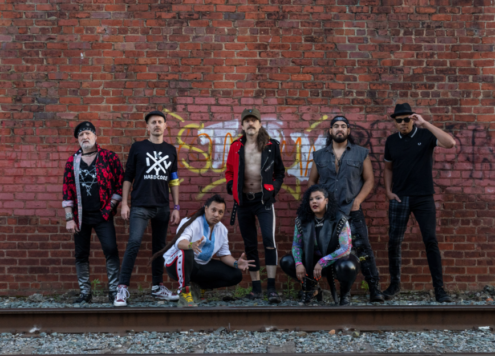
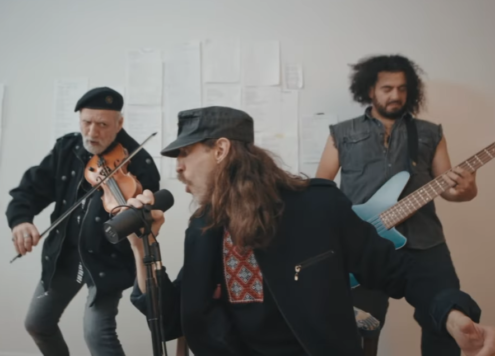
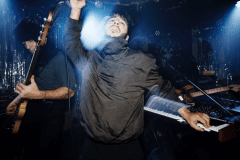
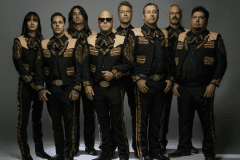
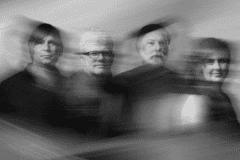
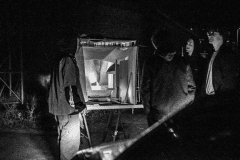

Social Media